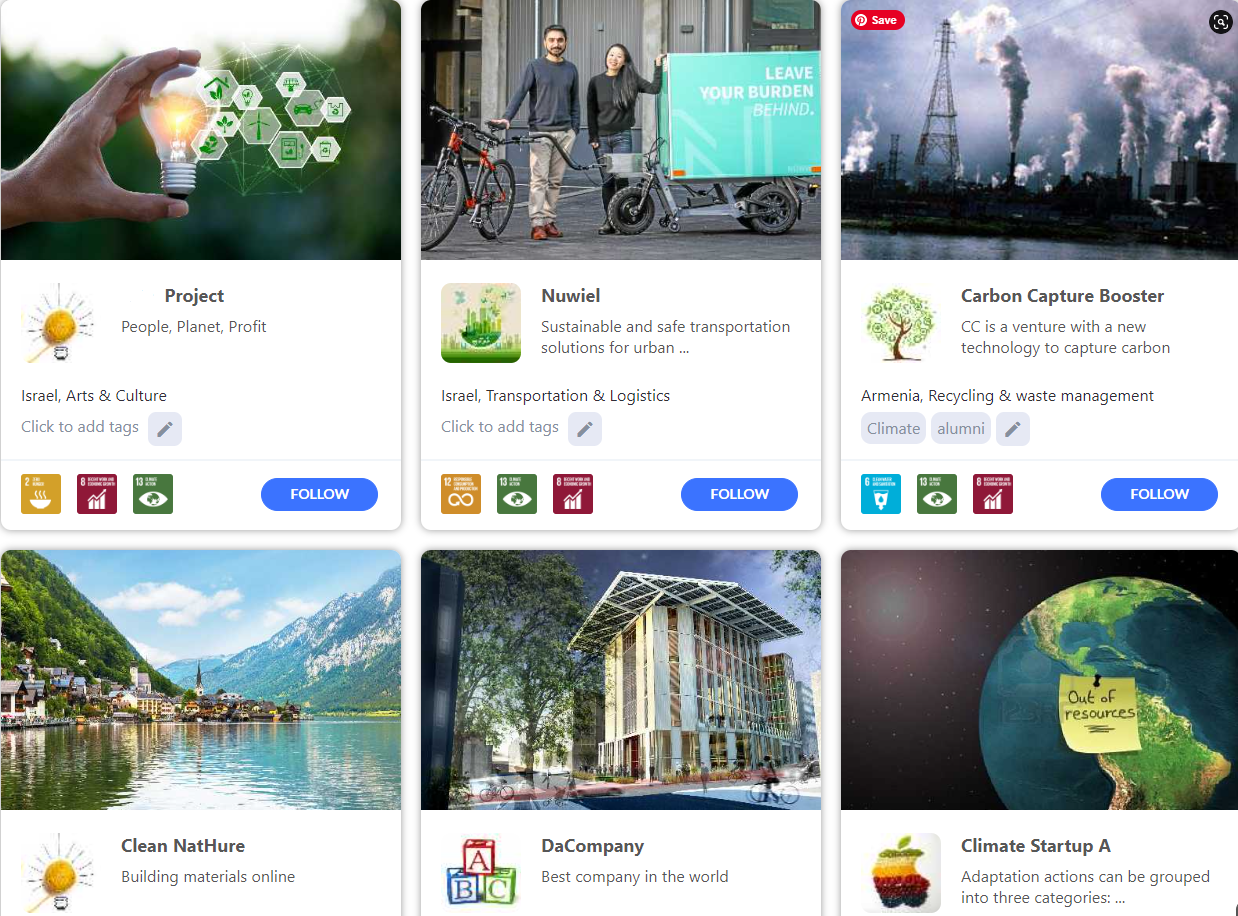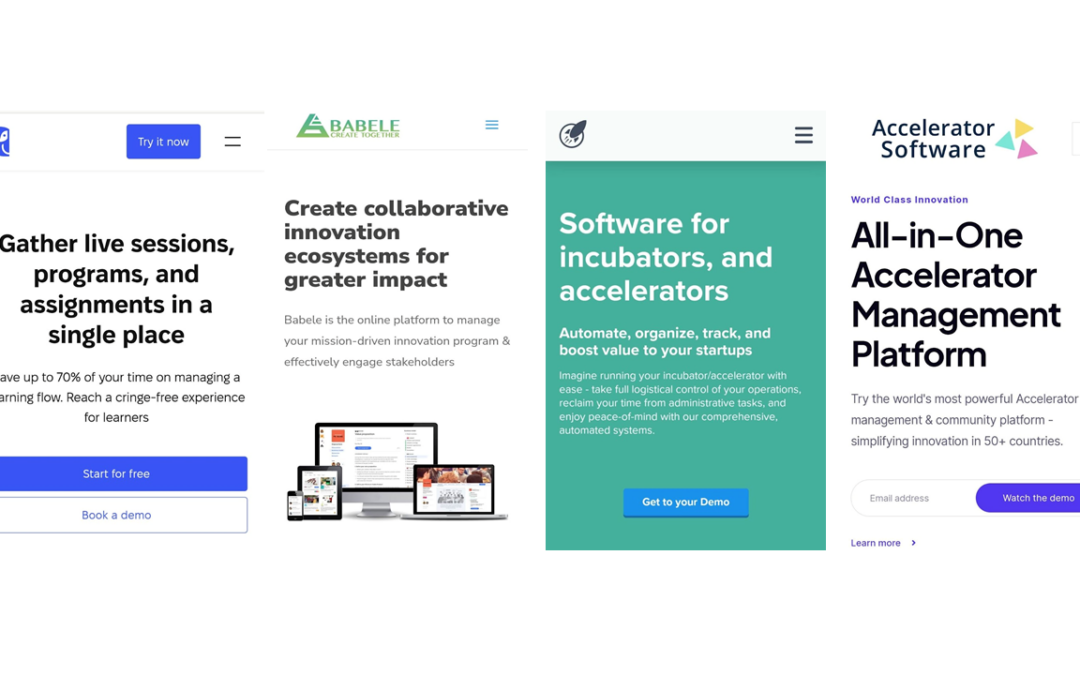Over here at Babele we wish to offer our partners great products: a state of the art platform design that meets the needs of acceleration and learning program managers. Not only are we constantly improving, we also think deeply about the future of business acceleration: How can programs successfully transfer their teams and contents in the digital realm? Do existing tools offer the best learning journey for startup builders? How do we empower administrators to facilitate real team collaboration?
Different tools are best at different things, and if any claims to be best at all, it is probably overselling itself. Conversely, each team runs their acceleration program with specific goals in mind, so as a manager, make sure to pick the tool which best does the job you set out to do! Below we review components offered by four accelerator management platforms: AcceleratorApp, Accelerator Software, Babele, and EducateMe. Which features are you looking for or find most valuable? Let us know in the comments!
1. Application management
This key process of your program, the launch and collection of applications, can now be automated: you can build custom forms, rate, assess and sort applications, and send Accept/ Reject emails in one click. This will make your life easier when launching a program at scale! Almost all tools offer application management. The highly customizable process in AcceleratorApp allows for 1, 2 or even 3 stage application processes and extensive internal coordination.
2. Acceleration process
Sometimes called business methodology, learning program, knowledge hub, it all comes down to the same: providing concrete steps to help startups refine their idea, scale etc. is key to a program, and therefore to the hosting platforms. The four platforms provide a focus on content, or a focus on mentorship, or both. While mentorship features are more common (see below), the content based learning varies greatly: from a basic library of materials (AcceleratorApp), to tasks and checklists for completing work (AcceleratorApp and Accelerator Software), and to structured, step by step acceleration through custom methodologies (Babele). Here, each program can upload their own methodology or customize existing templates. Well designed guides and assignments will help teams create outputs which are then evaluated and improved on – marking progress and performance on specific OKRs. It is you, the administrator, who defines the KPIs for the startups, the timeline for reporting them, and the system takes care to send reminders to the team. For cohort based learning and organizations pursuing online education, EducateMe is well suited.
3. Mentorship
Singling out the mentors in all platforms is easy to do, by assigning different user roles (or even a broader range of custom roles, in some) which differentiate, at a minimum, between members, mentors, and admins.
The Mentorship component focuses on matchmaking and scheduling coaching sessions. In Babele, automated matchmaking is based on specific requests for skills created by project teams. Bringing advisors on demand makes for a dynamic mix-and-match, using the expertise available in the ecosystem in the best way. The sessions are followed up by additional discussion and mutual rating. The AcceleratorApp offers features for extensive monitoring of the coaching process – through evaluations for coaches, startup tasks, including open feedback and metrics based assessments. A coaching dashboard comes in handy to keep track of everyone’s progress.
4. Startup data collection
As your program progresses, monitoring and collecting startups’ and founders’ data will help you intervene when needed and improve your program every year.
Which data is being collected? Depending on the platform, it ranges from minimal to extremely comprehensive. In AcceleratorSoftware, a team makes progress by going through Checklists and Tutorials, but analytics are not readily available. In the AcceleratorApp, the monitoring is done through the coaching sessions, whereas in Babele the assessment is done through startups’ progress in methodology and the KPIs you defined. You get a consolidated portfolio performance at any given point in time. EducateMe is also strong at tracking overall participant engagement with the courses, session attendance and online presence.
Finding the sweet spot when it comes to the type and amount of startup data you want is important. Having lots of features can be empowering, but it can also be paralyzing and demotivating administrators. Ultimately, this impacts overall user retention, and the program’s success, so you decide what your goals are!
5. Pricing
The pricing models for accelerator management software are subscription models, and range from $2,000 to $6,000 per year, depending on the plan chosen. The plans are based on the number of startups joining the system (AcceleratorApp, Babele), the number of active learners (EducateMe), the number of user licenses (AcceleratorApp), or a mix. Look for the pricing that best meets your long term needs, and note that as your program grows, additional costs can be incurred when having more members joining or when you will need more hands on deck to administrate the platform. We should note that in Babele, any number of users and admin licenses are possible.
In addition to the above, the basic features included are:
- CRMs are straightforward – the main difference is how much startups and users can interact with each other, which information is public/ private, and the extent to which admins can play with the settings
- Events and discussion boards are generally available and intuitive
- Resource repositories and uploading different types of media files are common
- Meetings setup and integration with video conferencing tools and calendars is also something that you can typically expect
If you have read this far, you are probably asking: okay, but how do I really differentiate between them? We believe that a key differentiation between platforms rests on the user experience and effectiveness of the acceleration journey. To explain this, we need to talk about engagement, the wild card which can make or break your experience.

View of an ecosystem in Babele
Wildcard – Ecosystem engagement
If you, like us, believe that culture eats technology for breakfast, then an important thing is for teams to actually enjoy and feel empowered by the platform, in their own projects but also as members of the same program. Teams are the unique ingredient of a ventures’ success, so we should actively support their connection with others who can contribute to their idea.
It is common that in a platform, startups can only see their workspace, not other teams’. Babele offers the opposite option: a member can follow ventures and their public updates, as well as invite external stakeholders to their project. As its tagline states, Babele is about creating together. Each startup makes progress and achieves KPIs through the collective work of members, who submit assignments as a real team. Learning progress and assignments can be made visible across the community, if team members so decide. A team can easily connect with external stakeholders through dedicated pages (read Investors!). The privacy settings convenient for each stakeholder are managed from the admin console.
What happens with the relations you helped create after the program ends? How do you continue to offer value to all stakeholders? How do you keep track of how ventures fare over the years? Finally, all the startups’ data you collected is gold, how are you using it? At Babele, we believe there is room for transforming acceleration programs into ecosystems where the value for each player is augmented constantly, not just a snapshot in time.
As we wrote earlier in our blogpost about crowdsourcing social innovation, it is high time for more cooperation in business, and we are already working on it. Looking forward to letting you in on the ecosystem upgrade in upcoming posts. If you are looking to empower your ecosystem, generate value for all your members to a greater extent, look this way 🙂
Written by Noemi Salantiu, Innovation lead at Babele

